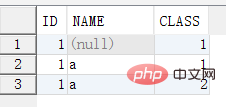How to add data in oracle
In Oracle, you can use the "INSERT...VALUES" statement to add data, the syntax "INSERT INTO data table name (field name 1, field name 2...) VALUES (data value 1, data value 2 ...)".

The operating environment of this tutorial: Windows 7 system, Oracle 11g version, Dell G3 computer.
Oracle inserts data (adds data)
1. Create a table and specify the structure
CREATE TABLE DB3.STUINFO( STUID INT, STUNAME VARCHAR(10), SEX INT, AGE INT, CLASSNO VARCHAR(10), STUADDRESS VARCHAR(10), GRADE INT, ENROLDATE DATE, IDNUMBER VARCHAR(20));
2. Insert data
Standard usage
INSERT INTO 数据表名 (字段名1,字段名2...) VALUES(数据值1, 数据值2...)
For example:
INSERT INTO DB3.STUINFO (STUID, STUNAME, SEX, AGE, CLASSNO, STUADDRESS, GRADE, ENROLDATE, IDNUMBER) values ('1', '龙七', '1', 26, 'C201801', '厦门市', '2018', to_date('01-09-2018', 'dd-mm-yyyy'), '3503021992XXXXXXXX');
You can find that Oracle can intelligently identify numbers even if they are enclosed in quotation marks.
You can also omit the column name declaration after the table when there is a one-to-one correspondence between the current and the following:
INSERT into DB3.STUINFO values (2, '龙八', 1, 25, 'C201801', '厦门市', '2018', to_date('01-09-2018', 'dd-mm-yyyy'), '3503021993XXXXXXXX');
When the column name declaration is omitted, an error will be reported if the before and after types do not correspond or if the information is missing.
When specifying a column name, columns with unspecified values are filled with null by default:
INSERT into DB3.STUINFO (STUID, STUNAME, SEX, AGE, STUADDRESS, GRADE, ENROLDATE, IDNUMBER) values (2, '龙八', 1, 25, '厦门市', '2018', to_date('01-09-2018', 'dd-mm-yyyy'), '3503021993XXXXXXXX');

You can also specify default values for columns while creating the table structure. , automatically filled in when there is no corresponding input:
CREATE TABLE a ( id INT, name CHAR(10) default 'a', class INT NOT NULL );
INSERT INTO a VALUES (1,NULL,1); INSERT INTO a (id,class) VALUES (1,1);
can be obtained:

INSERT INTO a(id,class) VALUES ((SELECT STUID FROM STUINFO WHERE STUNAME='龙七'),2);

CREATE TABLE DB3.STUINFO(
STUID INT,
STUNAME VARCHAR(10),
SEX INT,
AGE INT,
CLASSNO VARCHAR(10),
STUADDRESS VARCHAR(10),
GRADE INT,
ENROLDATE DATE,
IDNUMBER VARCHAR(20));
INSERT into DB3.STUINFO (STUID, STUNAME, SEX, AGE, CLASSNO, STUADDRESS, GRADE, ENROLDATE, IDNUMBER)
values ('1', '龙七', '1', 26, 'C201801', '厦门市', '2018', to_date('01-09-2018', 'dd-mm-yyyy'),
'3503021992XXXXXXXX');
INSERT into DB3.STUINFO
values (2, '龙八', 1, 25, 'C201801', '厦门市', '2018', to_date('01-09-2018', 'dd-mm-yyyy'), '3503021993XXXXXXXX');
INSERT into DB3.STUINFO (STUID, STUNAME, SEX, AGE, STUADDRESS, GRADE, ENROLDATE, IDNUMBER)
values (2, '龙八', 1, 25, '厦门市', '2018', to_date('01-09-2018', 'dd-mm-yyyy'), '3503021993XXXXXXXX');
INSERT into DB3.STUINFO (STUID, STUNAME, SEX, AGE, STUADDRESS, GRADE, ENROLDATE, IDNUMBER)
values (3, '龙九', 2, 23, '三门市', '2017', to_date('01-09-2017', 'dd-mm-yyyy'), '3503041995XXXXXXXX');
INSERT into DB3.STUINFO (STUID, STUNAME, SEX, AGE,CLASSNO, STUADDRESS, GRADE, ENROLDATE, IDNUMBER)
values (3, '龙九', 2, 23, 'C201702', '三门市', '2017', to_date('01-09-2017', 'dd-mm-yyyy'), '3503041995XXXXXXXX');
INSERT into DB3.STUINFO (STUID, STUNAME, SEX, AGE,CLASSNO, STUADDRESS, GRADE, ENROLDATE, IDNUMBER)
values (4, '龙十', 2, 23, 'C201702', '三门市', '2017', to_date('01-09-2017', 'dd-mm-yyyy'), '3503041995XXXXXXXX');Oracle Tutorial"
The above is the detailed content of How to add data in oracle. For more information, please follow other related articles on the PHP Chinese website!

Hot AI Tools

Undresser.AI Undress
AI-powered app for creating realistic nude photos

AI Clothes Remover
Online AI tool for removing clothes from photos.

Undress AI Tool
Undress images for free

Clothoff.io
AI clothes remover

Video Face Swap
Swap faces in any video effortlessly with our completely free AI face swap tool!

Hot Article

Hot Tools

Notepad++7.3.1
Easy-to-use and free code editor

SublimeText3 Chinese version
Chinese version, very easy to use

Zend Studio 13.0.1
Powerful PHP integrated development environment

Dreamweaver CS6
Visual web development tools

SublimeText3 Mac version
God-level code editing software (SublimeText3)

Hot Topics
 1389
1389
 52
52
 How to encrypt oracle view
Apr 11, 2025 pm 08:30 PM
How to encrypt oracle view
Apr 11, 2025 pm 08:30 PM
Oracle View Encryption allows you to encrypt data in the view, thereby enhancing the security of sensitive information. The steps include: 1) creating the master encryption key (MEk); 2) creating an encrypted view, specifying the view and MEk to be encrypted; 3) authorizing users to access the encrypted view. How encrypted views work: When a user querys for an encrypted view, Oracle uses MEk to decrypt data, ensuring that only authorized users can access readable data.
 How to delete all data from oracle
Apr 11, 2025 pm 08:36 PM
How to delete all data from oracle
Apr 11, 2025 pm 08:36 PM
Deleting all data in Oracle requires the following steps: 1. Establish a connection; 2. Disable foreign key constraints; 3. Delete table data; 4. Submit transactions; 5. Enable foreign key constraints (optional). Be sure to back up the database before execution to prevent data loss.
 What to do if the oracle can't be opened
Apr 11, 2025 pm 10:06 PM
What to do if the oracle can't be opened
Apr 11, 2025 pm 10:06 PM
Solutions to Oracle cannot be opened include: 1. Start the database service; 2. Start the listener; 3. Check port conflicts; 4. Set environment variables correctly; 5. Make sure the firewall or antivirus software does not block the connection; 6. Check whether the server is closed; 7. Use RMAN to recover corrupt files; 8. Check whether the TNS service name is correct; 9. Check network connection; 10. Reinstall Oracle software.
 How to paginate oracle database
Apr 11, 2025 pm 08:42 PM
How to paginate oracle database
Apr 11, 2025 pm 08:42 PM
Oracle database paging uses ROWNUM pseudo-columns or FETCH statements to implement: ROWNUM pseudo-columns are used to filter results by row numbers and are suitable for complex queries. The FETCH statement is used to get the specified number of first rows and is suitable for simple queries.
 How to create cursors in oracle loop
Apr 12, 2025 am 06:18 AM
How to create cursors in oracle loop
Apr 12, 2025 am 06:18 AM
In Oracle, the FOR LOOP loop can create cursors dynamically. The steps are: 1. Define the cursor type; 2. Create the loop; 3. Create the cursor dynamically; 4. Execute the cursor; 5. Close the cursor. Example: A cursor can be created cycle-by-circuit to display the names and salaries of the top 10 employees.
 How to solve the problem of closing oracle cursor
Apr 11, 2025 pm 10:18 PM
How to solve the problem of closing oracle cursor
Apr 11, 2025 pm 10:18 PM
The method to solve the Oracle cursor closure problem includes: explicitly closing the cursor using the CLOSE statement. Declare the cursor in the FOR UPDATE clause so that it automatically closes after the scope is ended. Declare the cursor in the USING clause so that it automatically closes when the associated PL/SQL variable is closed. Use exception handling to ensure that the cursor is closed in any exception situation. Use the connection pool to automatically close the cursor. Disable automatic submission and delay cursor closing.
 How to stop oracle database
Apr 12, 2025 am 06:12 AM
How to stop oracle database
Apr 12, 2025 am 06:12 AM
To stop an Oracle database, perform the following steps: 1. Connect to the database; 2. Shutdown immediately; 3. Shutdown abort completely.
 How to create oracle dynamic sql
Apr 12, 2025 am 06:06 AM
How to create oracle dynamic sql
Apr 12, 2025 am 06:06 AM
SQL statements can be created and executed based on runtime input by using Oracle's dynamic SQL. The steps include: preparing an empty string variable to store dynamically generated SQL statements. Use the EXECUTE IMMEDIATE or PREPARE statement to compile and execute dynamic SQL statements. Use bind variable to pass user input or other dynamic values to dynamic SQL. Use EXECUTE IMMEDIATE or EXECUTE to execute dynamic SQL statements.




